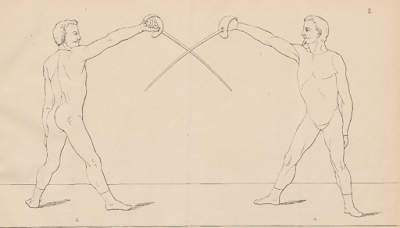An absolutely splendid German fencing book -- Die Fechtkunst auf Hieb -- from 1869, written by Ludwig Hornstein. These masterfully crafted drawings speak for themselves. With my rudimentary German I would translate its title as The Art of Fencing with Cuts (or Based on Cuts).
Tafel I. (table)
To those who are familiar with Six Cuts (Roworth, 1798): Horizontalquart = inside head = (5), Horizontalterz = outside head (6), Tief-quart = ascending inside cut = (3), Tief-terz = (4). Instead of one (1) Hornstein has two descending inside cuts: Steil-quart = steep (1) and Hoch-quart = high (1). Naturally these cuts can be delivered at any valid target.
Tafel I.: Fencing saber (1869)
Tafel II.: Engaging guard [2]
An interesting peculiarity of the system
(Tafel IX.)
In the fencing guard the heels of the fencer are not on the fencing line. Hornstein wrote: „Der rechte Fuss steht... etwa 8-10 Zoll rechts seitwärts entfernt mit der Fussspitze nach vorn.” [3] So according to the author the right foot should be approximately 8-10 Bavarian inches -- 19.5-24cm -- to the right (from the left foot), with its tip forward.
With these short remarks I am just barely scratching the surface of this rather interesting Bavarian saber fencing source.
__________________________________
- Ludwig Hornstein: Die Fechtkunst auf Hieb. München, 1869.
- „Regelmässige verhängte Säbelauslage” Standard hanging guard with a saber.
- Page 1 (Page 11:1 in the pdf).
- One Bavarian inch equals 2.43cm.




No comments:
Post a Comment